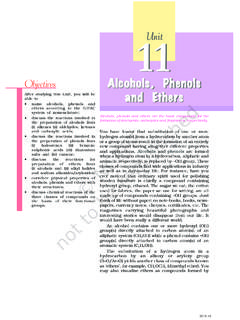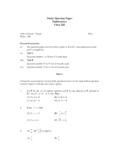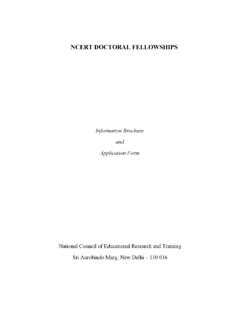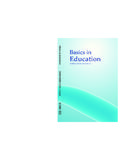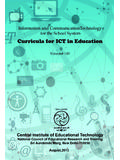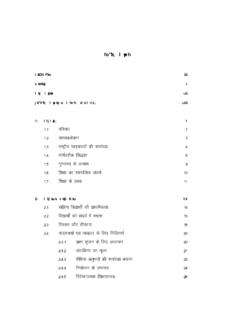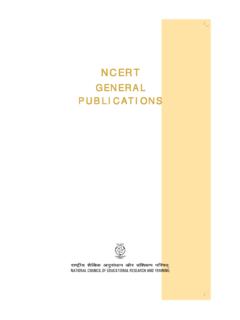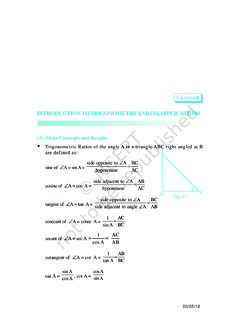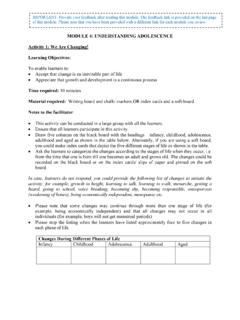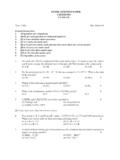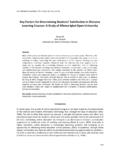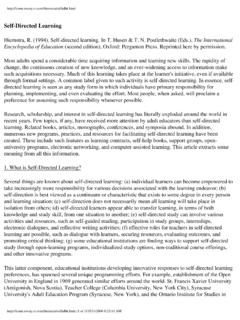Transcription of Syllabus for Bachelor of Education (B. Ed.) …
1 Syllabus for Bachelor of Education (B. Ed.) Programme DEPARTMENT OF teacher Education National Council of Educational Research and Training Sri Aurobindo Marg, New Delhi 110 016 2016 Syllabus for Bachelor of Education (B. Ed.) Programme B. P. Bhardwaj Prog. Coordinator DEPARTMENT OF teacher Education National Council of Educational Research and Training Sri Aurobindo Marg, New Delhi 110 016 2016 i CONTENTS Abbreviations and Acronyms Used ii-iii Foreword iv Preface v Introduction 1-7 Section A: Perspectives in Education PE 1: Childhood and Growing Up 8-11 PE 2: Contemporary India and Education 12-17 PE 3: Learning and Teaching 18-21 PE 4: Gender, School and Society 22-24 PE 5: Knowledge and Curriculum 25-29 PE 6.
2 Creating an Inclusive School 30-32 PE 7: Health, Yoga and Physical Education 33-36 Section B: Curriculum and Pedagogic Studies CPS 1: Language across the Curriculum 37-39 CPS 2&3: Pedagogy of two School Subjects (Part I &II) Social Science 41-47 Biological Science 48-54 Physical Science 55-60 Mathematics 61-67 Hindi 68-80 English 81-87 Urdu 88-95 Sanskrit 96-103 CPS 4: Assessment for Learning 104-109 Section C: Engagement with the Field Engagement with the Field 110 School Internship 111-117 Courses on Enhancing Professional Capacities (EPC) EPC 1: Reading and Reflecting on Texts 118-119 EPC 2: Arts in Education 120-123 EPC 3: Understanding ICT and Its Application 124-128 EPC 4.
3 Understanding the Self 129-131 Syllabus Revision and Development Team Annexure -1 ii ABBREVIATIONS AND ACRONYMS USED 2D - Two Dimensions - Bachelor of Arts and Bachelor of Education - Bachelor of Education - Bachelor of Science and Bachelor of Education BHU - Banaras Hindu University CALL - Computer Assisted Language Learning CBSE - Central Board of Secondary Education CCE - Comprehensive and Continuous Evaluation CD - Compact Disc CIET - Central Institute of Educational Technology CPS - Curriculum and Pedagogic Studies DEAA - Department of Education in Arts and Aesthetics DEGSN - Department of Education of Groups with Special Needs DEK - Division of Educational Kits DEL - Department of Education in Languages DEPFE - Department of Educational Psychology and Foundations of Education DESM - Department of Education in Science and Mathematics DESS - Department of Education in Social Sciences DGS - Department of Gender Studies DMS - Demonstration Multipurpose School DTE - Department of teacher Education EDUSAT - Educational Satellite EFA - Education for All EPC - Enhancing Professional Capacities ESD - Educational Survey Division FOSS - Free and Open Source
4 Software IASE - Institute of Advanced Studies in Education ICT - Information and Communication Technology IGNOU - Indira Gandhi National Open University INSET - In-service Training JNV - Jawahar Navodaya Vidyalaya JVC - Justice Verma Commission KV - Kendriya Vidyalaya LAN - Local Area Network LI - Learning Indicator LMS - Learning Management System - Master of Education MCQ - Multiple Choice Question MDG - Millennium Development Goal MOOC - Massive Open Online Courses NCERT - National Council of Educational Research and Training iii NCF - National Curriculum Framework NCFSE - National Curriculum Framework for School Education NCFTE - National Curriculum Framework for teacher Education NCTE - National Council for teacher Education NERIE - North East Regional Institute of Education NFG - National Focus Group NGO - Non-Government Organisation NPE - National Policy on Education NROER - National Repository of Open Educational Resources ODL - Open Distance Learning OER - Open Educational Resources PBL - Problem Based Learning PE - Perspectives in Education PMD - Planning and Monitoring Division PMMMNMTT - Pandit Madan Mohan Malviya National Mission on Teachers and Teaching POA - Programme of Action PTA - Parent teacher Association
5 PWD - Persons with Disability RIE - Regional Institute of Education RLO - Reusable Learning Objects RMSA - Rashtriya Madhyamik Shiksha Abhiyan RTE - Right to Education RTI - Right to Information SC - Scheduled Castes SCERT - State Council of Educational Research and Training SDMC - School Development and Monitoring Committee SMC - School Management Committee SSA - Sarva Shiksha Abhiyan ST - Scheduled Tribes SWOT - Strengths, Weaknesses, Opportunities and Threats TPCK - Technological Pedagogical Content Knowledge TV - Television UDL - Universal Design for Learning UNCRPD - United Nation Convention on the Rights of Persons with Disabilities USSR - Union of Soviet Socialist Republic UT - Union Territory VMC - Vidyalaya Management Committee WAN - Wide Area Network iv FOREWORD The NCERT has constantly been engaged with improving the quality of school Education through development of curriculum, textbooks, supplementary books, educational kits, teachers handbooks, etc.
6 And also through the implementation of schemes and programmes aimed at the continuing professional development of school teachers and teacher educators. The Regional Institutes of Education (RIEs) at Ajmer, Bhopal, Bhubaneshwar, Mysore and Shillong as constituent units of NCERT, are also responsible for preparing teachers for schools and teacher Education institutions. The teacher Education Programmes offered in the RIEs have the recognition of the National Council for teacher Education (NCTE), which is the statutory body responsible for regulating teacher Education in the country. Thus, the RIEs follow the NCTE Regulations including stipulations concerning teacher Education Curriculum.
7 The Justice Verma Commission (JVC) appointed by the Government of India at the behest of the Hon ble Supreme Court of India, submitted its report in 2012. The Commission made several recommendations for revamping the system of teacher Education in the country, such as introducing integrated teacher Education programmes of longer duration, enhancing the duration of existing teacher Education programmes and upgrading the status of teacher Education by making the entire system as part of higher Education . To translate the vision of JVC into reality, the National Council for teacher Education (NCTE) revisited its regulations, norms and standards for various teacher Education programmes and notified new Regulations on 1st December, 2014.
8 As per the Regulations the duration of the and programmes has been enhanced from one year to two years. The NCERT had introduced the Programme of two years duration in the year 1999 in its four RIEs in pursuance of the recommendations of the NCTE Curriculum Framework of 1998. The programme has been in operation for more than 15 years. As such the RIEs have already gained enough experience in the implementation of a programme of longer duration. In the light of the NCTE Regulations, 2014, the NCERT decided to revisit the curriculum followed in the RIEs for which it set up a Committee comprising the faculty of RIEs and various departments of NIE and eminent teacher educators.
9 The Department of teacher Education at the NIE, NCERT New Delhi was entrusted the responsibility to coordinate of the development of the Curriculum and syllabi of the programme. I appreciate the efforts made by Prof. Bhardwarj, experts and the faculty in this endevaour of Curriculum renewal. The NCERT shall welcome suggestion of the programme for further improvement in the Curriculum and Syllabi. H. K. Senapaty Director, NCERT New Delhi v PREFACE The NCERT was the first organization in the country to introduce two year programme in 1999 in its four Regional Institutes of Education (RIEs).
10 This programme has been in operation for the last fifteen years. The curriculum and syllabi designed by NCERT are approved by universities, to which the RIEs are affiliated. NCERT has now revisited the existing curriculum and syllabi in the light of stipulations of the NCTE Regulations, 2014. As visualized in the Regulations, the curriculum has been organized in three broad categories, namely (i) Perspectives in Education (ii) Curriculum and Pedagogic Studies and (iii) Engagement with the Field. In the revised syllabi the courses titled Health, Yoga and Physical Education , Gender School and Society and Creating an Inclusive School , have been assigned a prominent place in the course structure by making them compulsory core courses as part of the first component, that is, Perspectives in Education .
